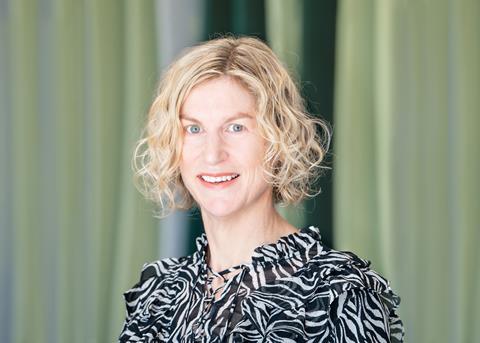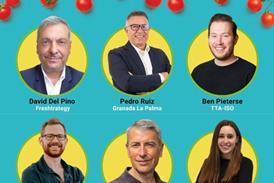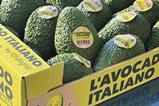In our exclusive interview, executive officer for sustainability Rachel Depree says the NZ kiwifruit company aims to be carbon positive by 2035
Rachel, what are Zespri’s goals when it comes to sustainability and the global food system?
Rachel Depree: Our overarching purpose is to help people, communities and the environment around the world thrive through the goodness of kiwifruit.
If we look at the food system today, two key statistics highlight the importance of change. The first is the 90-10 paradox cited in a recent IFPA report: 90 per cent of people recognise the importance of living a healthy lifestyle and making great eating choices, and 10 per cent actually embrace it. The second is that food production today accounts for one third of all global emissions.
Those are pretty powerful arguments that we need to make some shifts, and we believe we’re well positioned to help drive that. We offer a fruit that tastes great, is healthy and nutrient-dense, and is relatively low-impact in terms of its environmental footprint.
As we look to meet growing demand for our fruit, we’re also looking at how we can narrow the 90-10 gap. Our sustainability framework helps us do that. It’s built around three pillars – our fruit, our environment and our communities, with work focused on building resilience throughout our global supply chain, innovating with our partners so we can further reduce our impact and address our challenges, and making sure that as our industry succeeds, so too do our communities.
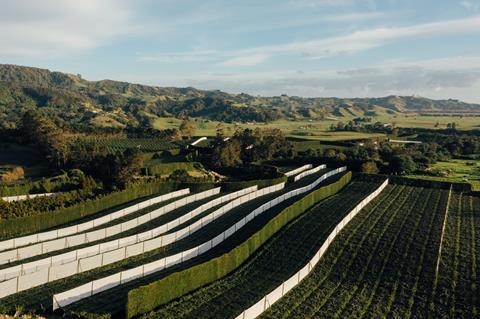
What is Zespri and its partners doing to make its supply chain more sustainable?
RD: While kiwifruit has a lower emissions footprint than many other products, we know there is work to be done in the supply chain, where most of our emissions come from.
One key initiative is our carbon-neutral trial. We’ve developed the first kiwifruit orchard carbon footprint calculator, which helps growers measure and understand their emissions, compare them to industry averages, and identify areas for improvement.
Shipping is also a key focus, as it accounts for more than 40 per cent of our emissions by product. We have worked to understand barriers to adopting low-emissions shipping, and advocated for change. As a result, we are making progress on reducing our shipping emissions from New Zealand-sourced fruit.
We also established a ground-breaking Green Shipping Partnership, a world-first between an exporter and a shipping provider, to accelerate the adoption of low-emission technologies and exploring the feasibility of green corridors between Europe and New Zealand.
This is a long game, but it’s one we need to get on with. Collaboration with other leading growers and farmers helps to catalyse change and identify win-win solutions that reduce impact on the environment, reduce costs, and lift resilience.
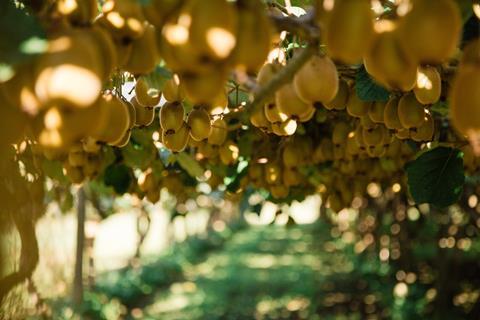
What is Zespri doing to help growers defend against climate change?
RD: We’ve seen the direct impact of this in recent years. Growers have faced frost, hail, cyclones, heavy rain, and extreme heat. Warmer winters have also resulted in poorer budbreak and lower yields.
Mitigating these risks is important in being able to deliver sustainable value, and that drives a lot of the goals we’ve set, including our work to be a carbon neutral industry.
We have already completed a number of initiatives to give us a sense of what we’re facing and how we can best respond. That includes our Climate Change Risks and Opportunities Report, our Climate Change Strategy, and our Climate Change Adaptation Plan.
But there’s a lot of work still to do, and our science-aligned net-zero roadmap outlines some of the significant decarbonisation challenges we face.
Our focus now is on new technologies, new growing systems, and new varieties of kiwifruit that can reduce our exposure to the weather, and support growers to produce more fruit, more sustainably, and in a manner that is more labour friendly.
That’s supported by initiatives like Xlabs NZ’s Future of Food programne, which looks at how we can fast-track the adoption of low-emission solutions on orchards and in post-harvest operations; and ZAG, the Zespri Innovation Fund, an annual US$2mn investment in partnerships with forward thinking innovators to address these challenges.

Zespri kiwifruit is known for its nutritional benefits. What role do you see for it in healthier diets and a transformed food system?
RD: We believe we can show there are products, like ours, that are produced in a sustainable way, taste great, and support a healthy lifestyle. That’s really what we want people to think when they see our brand.
Our Kiwi Brothers are a great way to promote this. They highlight our fruit’s many nutritional benefits in a fun and engaging way. To support this, we’ve launched initiatives like the Choose Real campaign in Europe, encouraging people to make eating ‘real’ food a sustainable habit.
This season, our healthy eating campaign in Japan focused on improving global health outcomes by encouraging people to swap out one unhealthy food for a serving of fresh fruit or vegetables every day. And our Fruit Box used sustainable packaging to nudge people towards consuming a kiwifruit every day.
Our goal is not just to provide a delicious fruit but to contribute to a broader transformation of the food system, promoting healthier diets and better nutrition worldwide.
What actions must the industry take next on sustainability? And how will Zespri identify and achieve its own sustainability goals?
RD: The landscape in which we operate is evolving rapidly. Consumer and customer expectations are changing, and regulatory demands increasing. It’s important we respond to these now and ensure we are prepared for the future.
We have set ambitious goals at Zespri to be carbon positive across our entire supply chain by 2035, have 100 per cent recyclable, reusable, or compostable packaging by 2025, and more. Like many, we experience challenges such as the high cost of transition to more environmentally friendly materials, and the lack of recycling infrastructure in some key markets.
So we’re still working towards these goals, and it’s critical that we do so closely with growers and partners, educate our communities, and find partners across and outside our supply chain.
That will mean we reduce our carbon footprint, make our growing systems more resilient to climate impacts, and help our consumers live an overall healthier lifestyle. By doing so, we’ll be well positioned to help transform the food system.
